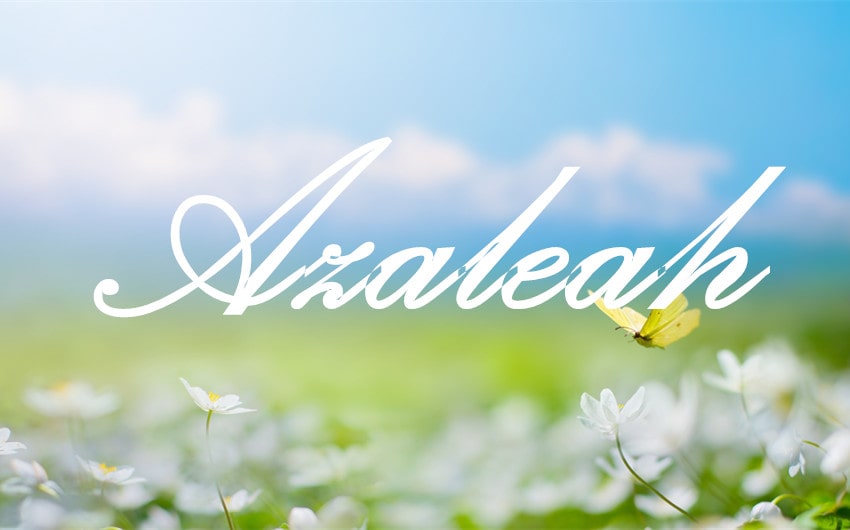Azaleah Name Meaning, Origin, and Symbolism Across Cultures
The Azaleah name meaning is rooted in nature, faith, and timeless elegance. Although it’s considered a modern and uncommon name, Azaleah carries profound symbolism that stretches across languages and cultures. It draws inspiration from the azalea flower — a bloom admired for its delicate appearance and remarkable strength to thrive in challenging environments. Like the flower itself, the name Azaleah embodies resilience, purity, and beauty that endures. In this article, you’ll discover the linguistic origin of Azaleah, the symbolic meaning behind it, and how different cultures and spiritual traditions have interpreted this graceful and uplifting name.
Origin and Linguistic Background of the Name Azaleah
The name Azaleah finds its origin in Azalea, which comes from the ancient Greek word “azaleos” (ἀζαλέος) meaning “dry.” This term originally described plants that grew in arid or rocky soil. Over time, the azalea plant became admired not for its dryness but for its ability to flourish in difficult environments, transforming its meaning into one of perseverance, grace, and natural beauty.
When adapted into English as Azalea, the word became associated with a family of flowering shrubs known for their vivid colors and stunning spring blooms. These flowers are often cultivated as symbols of renewal, endurance, and the joy of life’s returning cycles.
Azaleah adds a gentle, modern variation to this ancient name. The addition of the “-ah” ending gives it a lyrical, almost biblical resonance, similar to names like Hannah, Leah, or Moriah. This subtle shift not only softens the pronunciation but also gives the name a sense of depth and spirituality.
Although Azaleah is not found in ancient Greek or Hebrew texts, its construction and sound carry echoes of traditional faith-based names — those that often symbolize divine grace or connection with nature’s purity. The result is a name that feels both classical and contemporary: rooted in the earth yet elevated by spirit.
Azaleah therefore blends two meaningful traditions: the strength of nature and the devotion of faith. It captures the image of a flower blooming even in dry soil — a perfect metaphor for resilience, hope, and enduring beauty.
Symbolic Meaning of the Name Azaleah
At its heart, the name Azaleah embodies layers of symbolic meaning that extend beyond its linguistic roots. It represents beauty, balance, and the power of renewal — qualities inspired by the azalea flower itself.
In the Victorian language of flowers, azaleas carried deep emotional messages. They were often given to express temperance, passion, and devotion. To receive an azalea symbolized admiration and affection but also carried a gentle warning: to take care of the things one cherishes, as beauty can be delicate. This blend of caution and devotion gave the flower a poetic duality — one that reflects both strength and gentleness, much like the name Azaleah.
Because azaleas bloom in spring, they are also symbols of rebirth and new beginnings. They remind you of life’s natural rhythm — that even after hardship or “dry seasons,” there is always renewal. This makes Azaleah a particularly meaningful name for someone seen as a bringer of light, hope, or transformation.
Spiritually, Azaleah can be interpreted as a name that signifies faith, purity, and grace under pressure. The flower’s ability to thrive in tough conditions mirrors the human experience of finding strength through faith or perseverance. In this sense, Azaleah represents the belief that beauty often grows out of resilience — that challenges can refine the soul just as the sun coaxes blossoms from the earth.
In short, Azaleah symbolizes the beauty of endurance. It captures the idea that elegance and faith are not fragile traits, but forces that flourish in the face of adversity.
Cultural and Spiritual Interpretations of Azaleah
The name Azaleah carries universal appeal, and its deeper meanings can be seen through various cultural and spiritual lenses. Across different traditions, its linguistic origin and floral symbolism connect to themes of endurance, love, and spiritual awakening.
Greek Influence: The earliest roots of the name lie in the Greek word azaleos, meaning “dry.” This might sound ordinary, but in Greek philosophy and literature, dryness symbolized strength and discipline — qualities of self-control and virtue. The transformation of azaleos into Azalea and eventually Azaleah reflects a journey from plainness to grace, from simplicity to bloom. It reminds you that the most beautiful growth often comes from humble or difficult beginnings.
Biblical Resonance: While Azaleah does not appear in the Bible, the “-ah” suffix gives it a distinctly biblical tone, similar to names such as Jeremiah, Moriah, or Leah. Many of these names with “-ah” endings are associated with divine presence or spiritual connection. This subtle phonetic link makes Azaleah feel as though it could belong among names of faith — evoking closeness to God, purity, and renewal. In a symbolic sense, Azaleah can represent God’s grace blooming in the dry places of life.
Eastern Symbolism: In Japanese culture, azaleas (tsutsuji) are admired for their beauty and are often associated with self-control, strong love, and patience. They appear in art, poetry, and festivals, where they represent enduring affection and balance in relationships. To the Japanese, the azalea is not just ornamental but a reflection of disciplined grace — flourishing without excess, humble yet radiant.
Western Symbolism: In Western and Christian symbolism, flowering plants like the azalea have long been used to represent divine creation, purity, and spiritual renewal. The blooming of flowers after winter mirrors the resurrection theme of the Christian faith — life returning from stillness. Thus, Azaleah carries undertones of hope, rebirth, and the miracle of God’s timing.
Modern Appeal: Today, Azaleah is appreciated not only for its elegant sound but also for its layered meaning. It’s a name that connects natural beauty with inner strength — reflecting harmony between body, mind, and spirit. Parents drawn to names that feel both earthy and heavenly often choose Azaleah for its soft rhythm and enduring symbolism.
Across all these interpretations, one theme remains constant: Azaleah represents the grace of perseverance — the beauty of faith that endures through difficulty and blossoms in light.
Variations and Related Names
Like many floral or spiritually inspired names, Azaleah shares roots and style with several related names across cultures. Each variation carries a nuance that adds to the name’s charm while maintaining its central meaning of renewal, grace, and divine connection.
-
Azalea – The original form of the name; from the Greek azaleos, meaning “dry.” Represents beauty that thrives in unlikely places.
-
Azalia – A Hebrew variant meaning “God has reserved” or “near God,” giving the name a more direct spiritual dimension.
-
Azalya / Azaliyah – Modern adaptations combining Hebrew and floral influences, often chosen for their lyrical sound.
-
Zaleah / Zalaya – Creative names inspired by similar sounds; they carry the same sense of elegance and uniqueness.
-
Leah – A classic biblical name meaning “weary” or “delicate,” often connected to Azaleah through its soft, feminine tone.
-
Azariah – A Hebrew name meaning “God has helped,” sharing a similar ending and spiritual feeling with Azaleah.
-
Amaryllis – Another Greek flower name symbolizing radiant beauty and pride.
-
Dahlia – Derived from the flower symbolizing grace and dignity, sharing a similar natural inspiration.
-
Lilia / Liliah – From the lily flower, representing purity and devotion.
-
Zinnia – Another botanical name symbolizing endurance and lasting affection.
These related names show how Azaleah belongs to a broader family of floral and faith-inspired names that celebrate the harmony between natural beauty and spiritual meaning.







